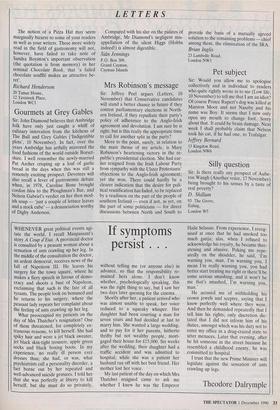If symptoms persist . . .
WHENEVER great political events agi- tate the world, I recall Maupassant's story A Coup d'Etat. A provincial doctor is consulted by a peasant woman about a sensation of ants crawling up her leg. In the middle of the consultation the doctor, an ardent democrat, receives news of the fall of Napoleon III. He leaves his surgery for the town square, where he makes a fiery speech in favour of demo- cracy and shoots a bust of Napoleon, exclaiming that such is the fate of all tyrants. The people look on bemused and he returns to his surgery, where the peasant lady repeats her complaint about the feeling of ants crawling up her leg. What preoccupied my patients on the day of Mrs Thatcher's resignation? One of them threatened, for completely ex- traneous reasons, to kill herself. She had spiky hair and wore a jet black sweater, Jet black skin-tight trousers, apple green socks and black boxing boots. In my experience, no really ill person ever dresses thus; she had, or was, what psychiatrists call a personality disorder, a fact borne out by her repeated and well-advanced suicide gestures. I told her that she was perfectly at liberty to kill herself, but she must do so privately,
without telling me (or anyone else) in advance, so that the responsibility re- mained hers alone. I don't know whether, psychologically speaking, this was the right thing to say, but I saw her two days later queuing for the cinema.
Shortly after her, a patient arrived who was almost unable to speak, her voice reduced to a squeaky whisper. Her daughter had been courting a man for seven years and had decided at last to marry him. She wanted a large wedding, and to pay for it her parents, hitherto thrifty but not wealthy people, mort- gaged their house for £15,000. Six weeks after the wedding, their daughter had a traffic accident and was admitted to hospital; while she was a patient her husband ran off with her best friend. Her mother lost her voice.
My last patient of the day on which Mrs Thatcher resigned came to ask me whether I knew he was the Emperor Haile Selassie. From experience, I recog- nised at once that he had smoked too much ganja; alas, when I refused to acknowledge his royalty, he became thre- atening and abusive. Poking me repe- atedly on the shoulder, he said, `I'm warning you, man, I'm warning you, I mean I'm really warning you, you had better start treating me right or there'll be some serious smashing, and it won't be me that's smashed, I'm warning you, man.'
He accused me of withholding his crown jewels and sceptre, saying that I knew perfectly well where they were. And then he demanded repeatedly that I tell him his rights; only discretion dic- tated that I did not inform him of his duties, amongst which was his duty not to enter my office in a drug-crazed state to utter menaces. Later that evening, after he hit someone in the street because he resembled a childhood enemy, he was committed to hospital.
I trust that the new Prime Minister will legislate against the sensation of ants crawling up legs.
Theodore Dalrymple










































































 Previous page
Previous page